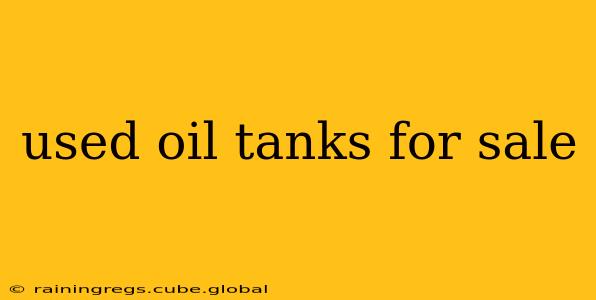Finding the right used oil tank can be a challenging task, requiring careful consideration of several factors to ensure safety, compliance, and longevity. This comprehensive guide will help you navigate the market, understand what to look for, and make an informed purchase. Whether you need a tank for your business or personal use, this guide provides essential information to help you find the perfect used oil tank for sale.
What Types of Used Oil Tanks Are Available?
The market offers various used oil tanks, each designed for specific applications and capacities. Common types include:
-
Aboveground Storage Tanks (ASTs): These are frequently used for storing various liquids, including used motor oil, and are commonly found in workshops, garages, and industrial settings. Sizes range significantly, from small, single-use tanks to large, multi-compartment units.
-
Underground Storage Tanks (USTs): While less common in the used market due to stricter regulations and environmental concerns, USTs are sometimes available for sale. It's crucial to verify their compliance with all local and federal regulations before purchase. Note that decommissioning and removal costs for USTs can be substantial.
-
Horizontal vs. Vertical Tanks: Used oil tanks are available in both horizontal and vertical configurations. The choice depends on available space and storage requirements. Horizontal tanks are typically better suited for larger capacities and limited vertical space.
What Should I Look For When Buying a Used Oil Tank?
Purchasing a used oil tank requires diligence. Here's a checklist of crucial factors to consider:
-
Tank Material and Condition: Inspect the tank thoroughly for signs of corrosion, rust, dents, or leaks. Common materials include steel, fiberglass, and polyethylene. Steel tanks are durable but susceptible to rust. Fiberglass and polyethylene are more resistant to corrosion but can be damaged by impacts.
-
Capacity and Dimensions: Determine the required storage capacity based on your needs. Accurate dimensions are crucial for ensuring the tank fits your designated space.
-
Age and History: If possible, obtain information about the tank's age, previous use, and maintenance history. A well-maintained tank with a documented history is preferable.
-
Compliance with Regulations: Ensure the tank complies with all relevant environmental regulations (e.g., EPA regulations for USTs). This includes proper secondary containment and spill prevention measures. Non-compliance can lead to significant fines and legal issues.
-
Accessories and Fittings: Check the condition of valves, gauges, and other fittings. Ensure they are functional and compatible with your system. Replacement parts might be needed, adding to the overall cost.
-
Installation and Transportation: Consider the logistics of transporting and installing the tank. This may require specialized equipment and professional assistance.
How Much Does a Used Oil Tank Cost?
The price of a used oil tank varies significantly based on its size, material, condition, and location. Smaller tanks might cost a few hundred dollars, while larger units could be several thousand. Always get multiple quotes from different sellers before making a purchase.
What are the environmental regulations for used oil tanks?
Environmental regulations concerning used oil tanks vary depending on location (federal, state, and local laws). However, general requirements often include secondary containment to prevent leaks and spills, proper ventilation to prevent the buildup of flammable vapors, and adherence to specific safety standards. Ignoring these regulations can lead to substantial fines and environmental damage. Before purchasing any used oil tank, thoroughly investigate the applicable regulations in your area.
Where can I find used oil tanks for sale?
Used oil tanks can be found through various channels:
- Online Marketplaces: Websites like eBay and Craigslist often list used oil tanks.
- Equipment Dealers: Many industrial equipment dealers handle the sale of used equipment, including storage tanks.
- Liquidation Auctions: Auctions of surplus equipment are another potential source for finding used oil tanks at competitive prices.
- Local Businesses: Check with local businesses, such as auto repair shops or industrial facilities, that may be selling off old tanks.
What are the risks of buying a used oil tank?
The main risks associated with buying used oil tanks include:
- Hidden Damage: Pre-existing damage might not be immediately apparent, leading to leaks or failure in the future.
- Non-Compliance: The tank might not meet current environmental regulations, resulting in fines or legal issues.
- Unexpected Repair Costs: The tank may require unexpected repairs or replacements of parts, increasing the overall cost.
By carefully considering these factors and conducting thorough inspections, you can successfully purchase a used oil tank that meets your needs while adhering to safety and environmental regulations. Remember to prioritize safety and compliance above all else.
